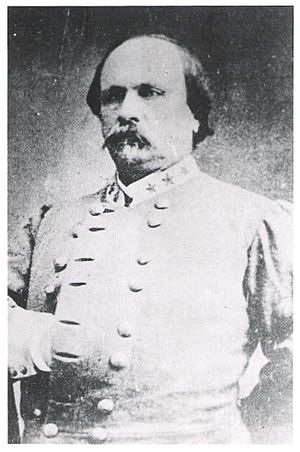William Henry Wallace facts for kids
Quick facts for kids
William Henry Wallace
|
|
|---|---|

General William Henry Wallace, C.S.A., Speaker of the South Carolina House of Representatives, and Circuit Judge.
|
|
| Speaker of the South Carolina House of Representatives | |
| In office 1876–1877 |
|
| Member of the South Carolina House of Representatives |
|
| In office 1860/1872–1877 |
|
| Personal details | |
| Born | March 24, 1827 Laurens County, South Carolina, U.S. |
| Died | March 21, 1901 (aged 73) Union, South Carolina, U.S. |
| Resting place | Union, South Carolina, U.S. |
| Spouse | Sarah Smith Dunlap |
| Relations | Daniel Wallace (father) John Calhoun Sheppard (son-in-law) |
| Alma mater | University of South Carolina |
| Military service | |
| Allegiance | |
| Branch/service | |
| Years of service | 1861–1865 |
| Rank | Brigadier General |
| Commands | 18th South Carolina Infantry |
| Battles/wars | American Civil War |
William Henry Wallace (born March 24, 1827, died March 21, 1901) was an important figure in South Carolina history. He was a Confederate Army general during the American Civil War. Before the war, he worked as a farmer (planter), published a newspaper, and was a lawyer. He also served as a legislator in the state of South Carolina.
In 1860, Wallace supported the idea of South Carolina leaving the United States. During the Civil War, he fought in the eastern part of the country. He led a group of soldiers called a brigade in the Army of Northern Virginia. After the war, he continued his work as a lawyer and farmer. He also served again as a legislator and later became a judge.
Contents
Early Life and Family
William Henry Wallace was born on March 24, 1827. His birthplace was Laurens County, South Carolina. His father was Daniel Wallace, who was a Congressman.
In 1849, William Henry Wallace graduated from South Carolina College. This school is now known as the University of South Carolina. Before the Civil War, he had several jobs. He was a farmer, a lawyer, and he published the Union Times newspaper in Union, South Carolina.
Wallace also served in the South Carolina legislature in 1860. During this time, he supported the state's decision to hold a meeting. This meeting was to discuss if South Carolina should leave the United States.
William Henry Wallace married Sarah Smith Dunlap. Her great-grandfather was John Hunter (South Carolina politician), who was a U.S. Senator. Wallace's son-in-law was John Calhoun Sheppard. Sheppard later became the 82nd Governor of South Carolina.
Serving in the American Civil War
After his time in the state legislature, Wallace joined the army. He became a private in the 18th South Carolina Infantry Regiment. He quickly moved up in rank.
In January 1862, he was elected first lieutenant and then captain. By May 1862, he was elected lieutenant colonel. His regiment stayed in South Carolina until July 1862.
Leading the Regiment
During the Second Bull Run Campaign, the colonel of Wallace's regiment was killed. This happened on August 30, 1862. Wallace then took command of the regiment as a colonel. He was officially given this rank later, on June 10, 1864.
Wallace led his regiment in important battles. These included the Battle of South Mountain and the Battle of Antietam. At this time, his regiment was part of a brigade led by Brigadier General Nathan G. "Shanks" Evans. After these battles, the brigade moved to defend Charleston, South Carolina.
The Battle of the Crater
In the spring of 1864, Wallace's brigade was sent to defend Petersburg, Virginia. This brigade was then led by Brigadier General Stephen Elliott, Jr.. On July 30, 1864, a major event happened. The Union Army set off explosives under the Confederate lines. This led to the Battle of the Crater.
Four companies of the 18th South Carolina Infantry were blown up by the explosion. General Elliott was also injured.
Promotion to Brigadier General
William Henry Wallace was promoted to brigadier general on September 20, 1864. This promotion was allowed under a Confederate law. This law let the Confederate President appoint temporary brigadier generals.
Since Elliott was hurt, Wallace took command of his former brigade. This brigade was part of Major General Bushrod Johnson's division. Wallace continued to lead his soldiers until the end of the war. The Army of Northern Virginia surrendered on April 9, 1865. This happened at Appomattox Court House, Virginia. Wallace was released from duty there on the same day.
Life After the War
After the Civil War ended, William Henry Wallace went back to South Carolina. He worked as a lawyer and continued to be a farmer.
He was elected to the South Carolina legislature again. He served three two-year terms, starting in 1872. From 1877 until he retired in 1893, Wallace served as a circuit judge.
William Henry Wallace passed away on March 21, 1901. He died in Union, South Carolina. He is buried in the Presbyterian Cemetery in Union.
 | Janet Taylor Pickett |
 | Synthia Saint James |
 | Howardena Pindell |
 | Faith Ringgold |

